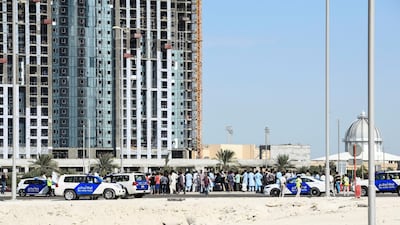Abu Dhabi Police defused a strike by hundreds of labourers who protested at their company's alleged failure to pay wages on time.
Officers calmed the demonstration on Reem Island on Sunday, which lasted several hours from 10.30am.
Workers from the privately-owned contractor said they had not been paid for three months. Some said they had a five-month backlog in wages.
The men began returning to their labour accommodation at 1.50pm following discussions with police officials.
Helicopters and dozens of police were involved at one stage.
Police said the labour ministry was handling the matter but officials were not available for comment on Sunday.
The authorities have taken an increasingly tough line against companies that fail to pay their employees on time. Two years ago the UAE Cabinet passed a decree to allow the government to halt the granting of work permits to companies with wage backlogs.
“I have not received my salary over the past five months, so I came here today,” said one of the demonstrators, who asked not to be named.
“I came from my country to work, and they don’t pay me, where will I eat from?”
He said his monthly salary is Dh2,500 and that his employer owes him Dh12,500.
An witness at the scene, a lorry driver, said the men were loud but respectful with police.
“I advised them not to become aggressive and start breaking glass, I told them you have to follow the rules,” said the 55-year-old Pakistani.
“I have been working in the UAE for 35 years, and I know that if you ensure you don't cause trouble or cause damage, the law will be on your side."
Reem Island resident Otto Comyn, a 27-year-old paramedic from South Africa, said he did not see any trouble but that “they were so noisy; they were everywhere".
The company involved, a general contractor tasked with fitting out high rise buildings, declined to comment but staff at the company's head office told The National that HR managers had been sent to the labour accommodation to settle the dispute with their employees.
The new measures passed by the Cabinet in 2016 were an update to the long-standing Wage Protection System — which is in place to track whether a company pays its employees on time or not.
If wages are 10 days late, the new measures kick in and the company is alerted it is in breach of labour rules. If wages remain unpaid for a total of 16 days, the authorities can cancel work permits, effectively shutting off operations. Fines of up to Dh5,000 per unpaid employee follow after 60 days.
Despite those measures, late payments remain an issue, particularly in the construction sector, and the authorities have urged employees to report their companies at the labour ministry or Tawafuq service centres — there are 15 in Abu Dhabi.
Benjamin Burgher, a legal consultant at Abu Dhabi Judicial Department, last week told The National that the recently-opened centres are designed to cut down on lengthy and expensive court cases, and quickly resolve disputes between employers and employees.
_________________
Read more:
Explained: What the UAE's new low cost insurance policy system means for the workplace
New labour centres to avoid need to take employer to court, say legal officials
Riot police called to halt workers' strike in Downtown Dubai


